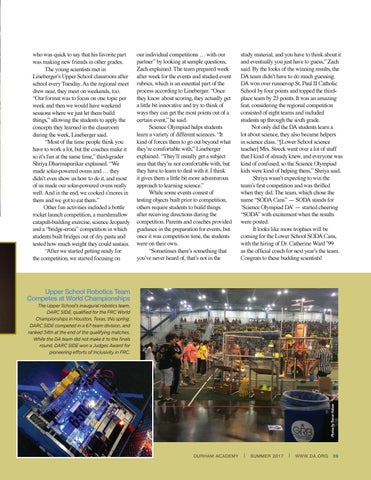who was quick to say that his favorite part was making new friends in other grades. The young scientists met in Lineberger’s Upper School classroom after school every Tuesday. As the regional meet drew near, they meet on weekends, too. “Our format was to focus on one topic per week and then we would have weekend sessions where we just let them build things,” allowing the students to apply the concepts they learned in the classroom during the week, Lineberger said. “Most of the time people think you have to work a lot, but the coaches make it so it’s fun at the same time,” third-grader Shriya Dharmapurikar explained. “We made solar-powered ovens and … they didn’t even show us how to do it, and most of us made our solar-powered ovens really well. And in the end, we cooked s’mores in them and we got to eat them.” Other fun activities included a bottle rocket launch competition, a marshmallow catapult-building exercise, science Jeopardy and a “bridge-eroni” competition in which students built bridges out of dry pasta and tested how much weight they could sustain. “After we started getting ready for the competition, we started focusing on
our individual competitions … with our partner” by looking at sample questions, Zach explained. The team prepared week after week for the events and studied event rubrics, which is an essential part of the process according to Lineberger. “Once they know about scoring, they actually get a little bit innovative and try to think of ways they can get the most points out of a certain event,” he said. Science Olympiad helps students learn a variety of different sciences. “It kind of forces them to go out beyond what they’re comfortable with,” Lineberger explained. “They’ll usually get a subject area that they’re not comfortable with, but they have to learn to deal with it. I think it gives them a little bit more adventurous approach to learning science.” While some events consist of testing objects built prior to competition, others require students to build things after receiving directions during the competition. Parents and coaches provided guidance in the preparation for events, but once it was competition time, the students were on their own. “Sometimes there’s something that you’ve never heard of, that’s not in the
study material, and you have to think about it and eventually you just have to guess,” Zach said. By the looks of the winning results, the DA team didn’t have to do much guessing. DA won over runner-up St. Paul II Catholic School by four points and topped the thirdplace team by 23 points. It was an amazing feat, considering the regional competition consisted of eight teams and included students up through the sixth grade. Not only did the DA students learn a lot about science, they also became helpers in science class. “[Lower School science teacher] Mrs. Streck went over a lot of stuff that I kind of already knew, and everyone was kind of confused, so the Science Olympiad kids were kind of helping them,” Shriya said. Shriya wasn’t expecting to win the team’s first competition and was thrilled when they did. The team, which chose the name “SODA Cans” — SODA stands for ‘Science Olympiad DA’ — started cheering “SODA” with excitement when the results were posted. It looks like more trophies will be coming for the Lower School SODA Cans, with the hiring of Dr. Catherine Ward ’99 as the official coach for next year’s the team. Congrats to these budding scientists!
Upper School Robotics Team Competes at World Championships
Photos by Trevor Nelson
The Upper School’s inaugural robotics team, DARC SIDE, qualified for the FRC World Championships in Houston, Texas, this spring. DARC SIDE competed in a 67-team division, and ranked 34th at the end of the qualifying matches. While the DA team did not make it to the finals round, DARC SIDE won a Judges Award for pioneering efforts of Inclusivity in FRC.
DUR HAM ACADEMY
|
SUMMER 2017
|
WWW.D A .OR G
39
